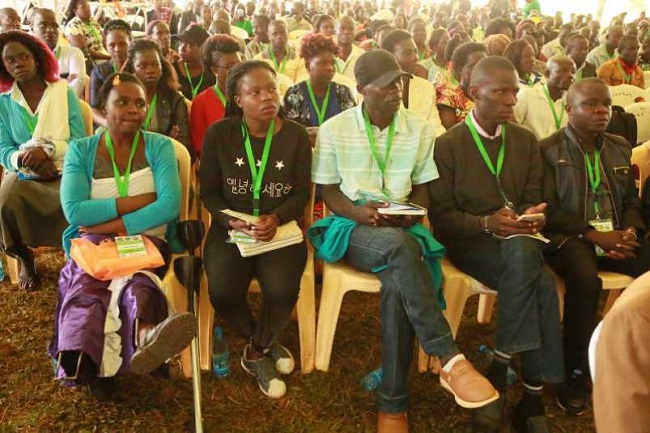Young environmental leaders from across Kenya have issued a declaration reaffirming their central role in the country’s green transition and forest conservation agenda. The declaration was made during of a three-day AfricanYouth4Forests (AY4F) National Youth Workshop held in Kitui County under the theme “From Science to Youth Action for Sustainable Forestry.”

Conducted by the African Forest Forum in collaboration with the Kenya Forestry Research Institute (KEFRI) and the Swedish University of Agricultural Sciences (SLU), the workshop is part of the continental build-up to COP30, scheduled for November 2025 in Brazil, where African youth will present their unified voice and policy recommendations on forestry, climate action, and sustainable development.
It provided a space for youth to co-develop practical solutions, enhance their skills in conservation and eco-preneurship, and advocacy in national and international forestry discourse.
The youth declaration outlines the challenges facing forest ecosystems in Kenya, ranging from climate change, limited inclusion of youth in policy-making, deforestation, to lack of access to funding and technical training. Despite these obstacles, young participants reaffirmed their readiness to lead through green innovation, community-based conservation, and forest-based entrepreneurship.
Their proposed solutions include tree nursery enterprises, digital storytelling for forest advocacy, carbon credit initiatives, climate-smart agroforestry, as well as timber and non-timber forest product enterprises and ecotourism.
“Young people are not just future leaders – they are today’s drivers of sustainability and innovation; we are ready to take charge in ensuring that our forests thrive while creating inclusive economic opportunities that benefit our communities and the planet,” the declaration states in part.
The AfricanYouth4Forests (AY4F) initiative represents a dynamic intersection between Africa’s verdant forests and its vibrant youth population that is four times larger than Europe’s and as ripe with potential. By fusing traditional wisdom with science and digital tools, AY4F empowers youth aged 18–30 to transform environmental aspirations into practical actions that protect biodiversity, mitigate climate impacts, and generate green livelihoods.
The national workshop was aimed at translating scientific and indigenous knowledge into youth-led action, equipping youth with tools for sustainable forest management and conservation, fostering innovation and entrepreneurship within the green economy, and strengthening youth advocacy for policy influence and decision-making.
Despite being among the most vulnerable to the effects of climate change, Africa’s youth are uniquely positioned to lead the green transition. Their digital proficiency, innovation, and grassroots knowledge and networks provides them the advantage to implement nature-based solutions at both local and global levels. Yet, their voices are often underrepresented in sustainability debates and policy forums.
“Our forests are not just natural resources; they’re our inheritance. And it’s our duty as youth to protect and restore them with both urgency and creativity,” said Esther Maina, one of the participants who is also the National Coordinator, Kenyan Youth Biodiversity Network, a youth-led membership organization that galvanizes youth action to respond to pressing environmental challenges like biodiversity loss, climate change, and pollution.
“Through the AfricanYouth4Forests project, we are connecting science and traditional knowledge with action, helping young people understand their role in forest governance and climate action. By integrating these, we create a holistic foundation for decision-making, innovation, and stewardship. This fusion empowers the youth to take informed action, preserve ecosystems, and design adaptive solutions that are both contextually relevant and scientifically sound, ensuring forests remain a source of livelihood, identity, and ecological balance for generations to come,” said Dr. Mutta, representing the AFF Executive Secretary-CEO, Prof. Labode Popoola.
Swedish University of Agricultural Sciences (SLU) Prof. Anders Roos and co-facilitator said that the AY4F initiative is more than a training – it’s a launchpad for youth-driven transformation. He added: “Through scientific understanding and creative problem-solving, African youth are being equipped to design forest solutions rooted in both innovation and local realities.”
The declaration issued strong calls to action: urging the Kenyan government to integrate youth in forestry governance, expand youth-focused green financing and training programs, and embed sustainable forest education across the curriculum particularly in tertiary education. The private sector, NGOs and development partners were urged to support youth with mentorship, technical support, storytelling platforms, and resources for enterprise incubation.
Speaking at the opening session, KEFRI Chief Executive Officer, Dr. Jane Njuguna, said that forests are at the heart of Kenya’s environmental resilience and socio-economic future, noting that empowering young people to become stewards of our forests is no longer optional but an urgent necessity.
“This workshop ensures that the next generation not only understands our forests but also actively shapes how they are governed, restored, and sustained,” stated Dr. Njuguna.
Urging the youth to harness forest resources as a source of employment and economic contribution, AFF Consultant, Dr. Joshua Cheboiwo, noted that forests are more than just natural treasures but also powerful engines for job creation and economic growth.
“We encourage youth to harness the vast opportunities within forestry, from sustainable timber and non-timber products to ecotourism, beekeeping, and green innovation. With creativity and commitment, young people can turn forest resources into thriving enterprises that support livelihoods while protecting the environment for future generations,” Cheboiwo said.
